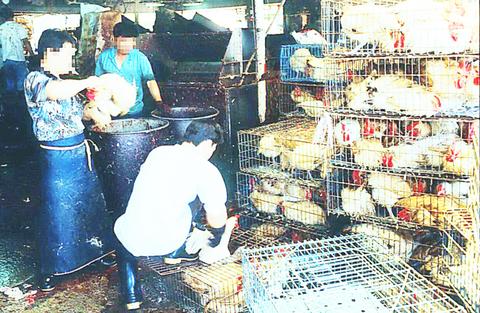Public health is being jeopardized by unsound slaughter regulations which allow the consumption of nearly 4 million unhealthy chickens a year, activists from animal conservation and environmental groups said yesterday.
The activists told a press conference in Taipei that the 170 million domestic chickens consumed each year in this country are slaughtered in traditional markets under unhygienic conditions.

PHOTO: THE ENVIRONMENT AND ANIMAL SOCIETY OF TAIWAN (EAST)
They said only 5 percent of the poultry are electrically slaughtered under conditions that meet the Chinese Agricultural Standards (CAS), a system that ensures the safety of agricultural products.
In the US, the activists said, about 2.3 percent of inferior slaughtered poultry meat would be thrown out.
"It implies that each year 3.91 million unhealthy chickens, which deserve to be thrown away, are eaten by consumers," said Chen Yu-min (
EAST members spent months making a documentary about chicken slaughtering in traditional markets -- and they said they were appalled by the lack of division between live chickens and killed ones.
"Most chickens have their throats cruelly cut by sharp knives and then are thrown into boiling water to remove their feathers before they have even breathed their last breath," said Shih Wu-hung (
Displaying photos and videotapes, activists said that waste-water contaminated by chicken giblets, feathers, chicken feces and blood was arbitrarily discharged in the markets.
"If the government doesn't regulate the slaughter of chickens, we're afraid that bird flu will hit Taiwan sooner or later," Chen said.
Two cases of bird flu reported in Hong Kong last week raised fears of another epidemic such as the one in 1997 that killed six people, forced the mass slaughter of millions of birds in the territory and briefly caused alarm about the possibility of a global epidemic.
Chen said that the bird flu virus is likely contracted by direct contact with chicken feces.
Jong De-shien (鍾德憲), associate professor of animal science at the National Taiwan University, told the press conference that a clear division is required at slaughtering plants between chicken carcasses, the gutted internal organs and waste matter.
Chen also said the frequent smuggling of poultry and agricultural products between Taiwan, China and Hong Kong have made this nation very vulnerable.
Chen criticized the government for excluding chicken slaughtering from the Husbandry Law (
The activists said that the Control Yuan should investigate the Council of Agriculture (COA) for its neglecting duties.
The COA's Bureau of Animal and Plant Health Inspection and Quarantine issued a press release yesterday afternoon, noting that 160 million broilers being slaughtered each year are examined and, on average, about 3 percent of them were discarded for not meeting standards.
The statement said that since last year the bureau has promoted the electronic slaughter of chickens and provides technical assistance to people who want to establish new slaughter houses.
The statement did not address the request to include poultry slaughter in the Husbandry Law.

A strong continental cold air mass is to bring pollutants to Taiwan from tomorrow, the Ministry of Environment said today, as it issued an “orange” air quality alert for most of the country. All of Taiwan except for Hualien and Taitung counties is to be under an “orange” air quality alert tomorrow, indicating air quality that is unhealthy for sensitive groups. In China, areas from Shandong to Shanghai have been enveloped in haze since Saturday, the ministry said in a news release. Yesterday, hourly concentrations of PM2.5 in these areas ranged from 65 to 160 micrograms per cubic meter (mg/m³), and pollutants were

Taiwan’s armed forces have established response protocols for a wide range of sudden contingencies, including the “Wan Chun Plan” to protect the head of state, the Ministry of Defense (MND) said today. After US President Donald Trump on Saturday launched a series of airstrikes in Venezuela and kidnapped Venezuelan President Nicolas Maduro, concerns have been raised as to whether China would launch a similar “decapitation strike” on Taiwan. The armed forces regularly coordinate with relevant agencies and practice drills to ensure preparedness for a wide range of scenarios, Vice Minister of National Defense Hsu Szu-chien (徐斯儉) told reporters before a

EVA Airways on Saturday said that it had suspended a pilot and opened an investigation after he allegedly lost his temper and punched the first officer several times as their plane was taxiing before takeoff at Los Angeles International Airport. According to a report published on Thursday by The Reporter, the incident occurred after the flight’s Malaysian first officer tried to warn the Taiwanese pilot, surnamed Wen (文), that he was taxiing faster than the speed limit of 30 knots (55.6kph). After alerting the pilot several times without response, the first officer manually applied the brakes in accordance with standard operating

Japanese Councilor Hei Seki (石平) on Wednesday said that he plans to visit Taiwan, saying that would “prove that Taiwan is an independent country and does not belong to China.” Seki, a member of the Japan Innovation Party, was born in Chengdu in China’s Sichuan Province and became a naturalized Japanese in 2007. He was elected to the House of Concilors last year. His views on the Chinese Communist Party (CCP) — espoused in a series of books on politics and history — prompted Beijing to sanction him, including barring Seki from traveling to China. Seki wrote on X that he intends